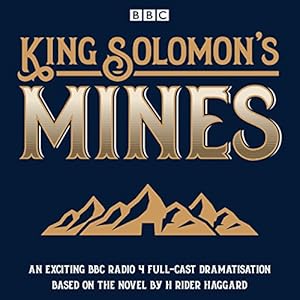BBC Radio Full-Cast Dramatisation
The 130 years since the first publication of H. Rider
Haggard’s African novel of ‘treasure, war and wild adventure’ have seen such
cultural and sociological change that it might be thought that his novels of
the Victorian empire would have little to attract our attention. Famously
written following the publication of Robert Louis Stevenson’s Treasure Island in 1885, when Haggard
told his brother he could write something ‘at least as good’ (or ‘half as good’),
King Solomon’s Mines was said to have
taken the author six (or sixteen, depending on one’s source) weeks to finish. It
was the start of Haggard’s lifelong and very lucrative career as a novelist. He
wrote more than fifty books. She, the
follow-up to King Solomon’s Mines, has
been estimated to have sold a staggering 80 million copies.
Whilst reflecting a fair few of the prejudices and givens of
nineteenth-century colonialism, Haggard does not entirely adopt the racism and misogyny
of his era. Dedicated to ‘all the big boys and little boys who read it’ (girls
read it too, but nineteenth-century parents often had firm views of what was
suitable for boys and what was suitable for girls), King Solomon’s Mines represents the memoirs of the book’s
protagonist, Allan Quatermain, as related to the author, so that Haggard’s own
opinions are at arm’s length. The book can certainly be said to show admiration
and respect for the peoples and cultures of Africa, and for its landscape, and
there is deprecating irony in the taunt by Gagool concerning the white man’s
insatiable desire for African diamonds:
Kenneth Colley starred as Quatermaine in a 1990 BBC Radio 4
adaptation, which is well worth finding, if you can. It is surprising that the
novel was not broadcast in the heyday of BBC radio (there is a forty-minute General
Mills Radio Adventure Theater recording from 1977, which aired on the CBS Radio
Network in the USA), but perhaps the many feature films satisfied the appetite
for Haggard. It is the 2017 adaptation in the BBC recording under review here and
it is gripping, entertaining and, in the appropriate places, moving – BBC radio drama at its
twenty-first century best.
It would be pointless to rehearse the plot. Just immerse
yourself in one of England’s foremost Victorian adventure writers, whose
imagination, fired by his five or so years in parts of what is now South Africa,
transports you to an exotic and dangerous lost world.
The cast, led by Tim McInnery as Allan Quatermaine, David
Sturzaker as Sir Henry Curtis and Simon Ludders as Captain John Good, features
outstanding African actors Sope Dirisu as Umbopa, Femi Elufowoju Jr as Twala
and Adjoa Andoh as Gagool. In his essay on Haggard, fellow author Graham Greene
wrote, ‘Enchantment is just what this writer exercised; he fixed pictures in
our minds that thirty years have been unable to wear away.’
This BBC Radio adaptation will do the same for a new
generation.
* * * * *
© copyright 2018 AudioBooksReview. All rights reserved.
Buy King Solomon’s Mines

